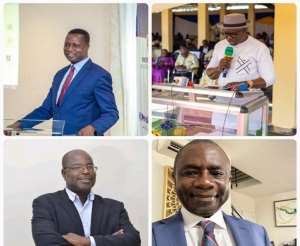
Over the past decade, Ghana has identified a gap in leadership and practice in many of the educational institutions and attributed it to one of the causes of low performance among learners. In addressing the abysmal performance among learners, a plethora of interventions have been put in place, however majority of these intervention projects are donor funded and its sustainability is challenged. The end results are that, once the donor project ends it becomes extremely difficult to scale up the treatment.
To ensure sustainability in the leadership training programmes, the Ghana government under the auspices of the Ministry of Education has introduced the National Educational Leadership Institute (NELI) which aims at institutionalising leadership training programme for educational leaders and prospective educational leaders.
NELI which has been approved by cabinet seeks to prepare educational leaders to advance transformation strategies in Ghanaian schools and beyond. The leading team of NELI under the leadership of Dr Charles Yeboah has conducted several stakeholder engagements to seek opinions from stakeholders who are either beneficiaries or activists of educational leadership programmes.
On 17th of November 2022, there was another stakeholder engagement at NODA Hotel in Fumesua, Ashanti Region which brought leaders from different institutions at National, Regional, District and local levels, both public and private together. Among the National leaders present were Dr. Christian Addai-Poku, Registrar of the National Teaching Council and his Deputy, Lawrence Sarpong, Dr Eric Nkansah (Director -General of Ghana Education Service) and Ms Angela Frimpomaa Nkansah (Director HR, Ghana Education Service). All Regional directors for education were also present. Resource persons like Professor George Oduro and Professor Jonathan Fletcher respectively from University of Cape Coast and University of Ghana were present to grace the occasion with their expertise.
Prof. George Oduro, in his speech raised concerns about the duplication of policies on leadership. He argued that the Secondary Education Improvement Programme, T-TEL Professional Education Leadership framework etc all indulge policies on leadership leading to policy fragmentation. Again, he concluded that education leadership is not the same as public leadership/ administration.
Taking his turn to address the gathering, Prof Jonathan Fletcher disclosed that the NELI initiative will solve challenges undermining quality education delivery in Ghana. Teacher Fletcher as he is affectionately known in the education fraternity used the opportunity to highlight the differences in how teachers are trained in the United Kingdom and in Ghana
Also, Madam Ivy Asantewa Owusu, the acting Bono Regional Director expressed optimism about the success of the initiatives to be spearheaded by NELI. She was in high hopes and appealed to her colleague regional directors to commit to NELI modules which can play a significant role in breeding quality and effective managers of the school system.
In an interview with Dr Addai-Poku, the registrar of the National Teaching Council, he indicated that NELI has come to address significant implementation gaps in the Pre-Tertiary Teacher Professional Development and Management (PTPDM) policy.
According to the Registrar, the PTPDM policy establishes formalised training for educational leaders and recommends portfolio development as evidence of practice.
He also indicated that the Education Regulatory Bodies Act 2020 (ACT 1023) requires the National Teaching Council to assess and issue appropriate licence to teachers after satisfying the conditions for registration, thus all who undergo the training will be given leadership certification from the Council and it shall be subjected to renewal in line with standardised provisions.
For Learning outcomes to be effective, there is the need for education managers to be equipped with relevant training needs that will build their competencies, skills, values and attitudes, thus the activities of NELI will lead to the transformation of the education system for the expected learning outcomes to be achieved.




 Lay KPMG audit report on SML-GRA contract before Parliament – Isaac Adongo tells...
Lay KPMG audit report on SML-GRA contract before Parliament – Isaac Adongo tells...
 Supervisor remanded for stabbing businessman with broken bottle and screwdriver
Supervisor remanded for stabbing businessman with broken bottle and screwdriver
 NDC watching EC and NPP closely on Returning Officer recruitment — Omane Boamah
NDC watching EC and NPP closely on Returning Officer recruitment — Omane Boamah
 Your decision to contest for president again is pathetic – Annoh-Dompreh blasts ...
Your decision to contest for president again is pathetic – Annoh-Dompreh blasts ...
 Election 2024: Security agencies ready to keep peace and secure the country — IG...
Election 2024: Security agencies ready to keep peace and secure the country — IG...
 People no longer place value in public basic schools; new uniforms, painting wil...
People no longer place value in public basic schools; new uniforms, painting wil...
 'Comedian' Paul Adom Otchere needs help – Sulemana Braimah
'Comedian' Paul Adom Otchere needs help – Sulemana Braimah
 Ejisu by-election: Only 33% of voters can be swayed by inducement — Global InfoA...
Ejisu by-election: Only 33% of voters can be swayed by inducement — Global InfoA...
 Minority will expose the beneficial owners of SML, recover funds paid to company...
Minority will expose the beneficial owners of SML, recover funds paid to company...
 Prof. Opoku-Agyemang has ‘decapitated’ the NPP’s strategies; don’t take them ser...
Prof. Opoku-Agyemang has ‘decapitated’ the NPP’s strategies; don’t take them ser...
